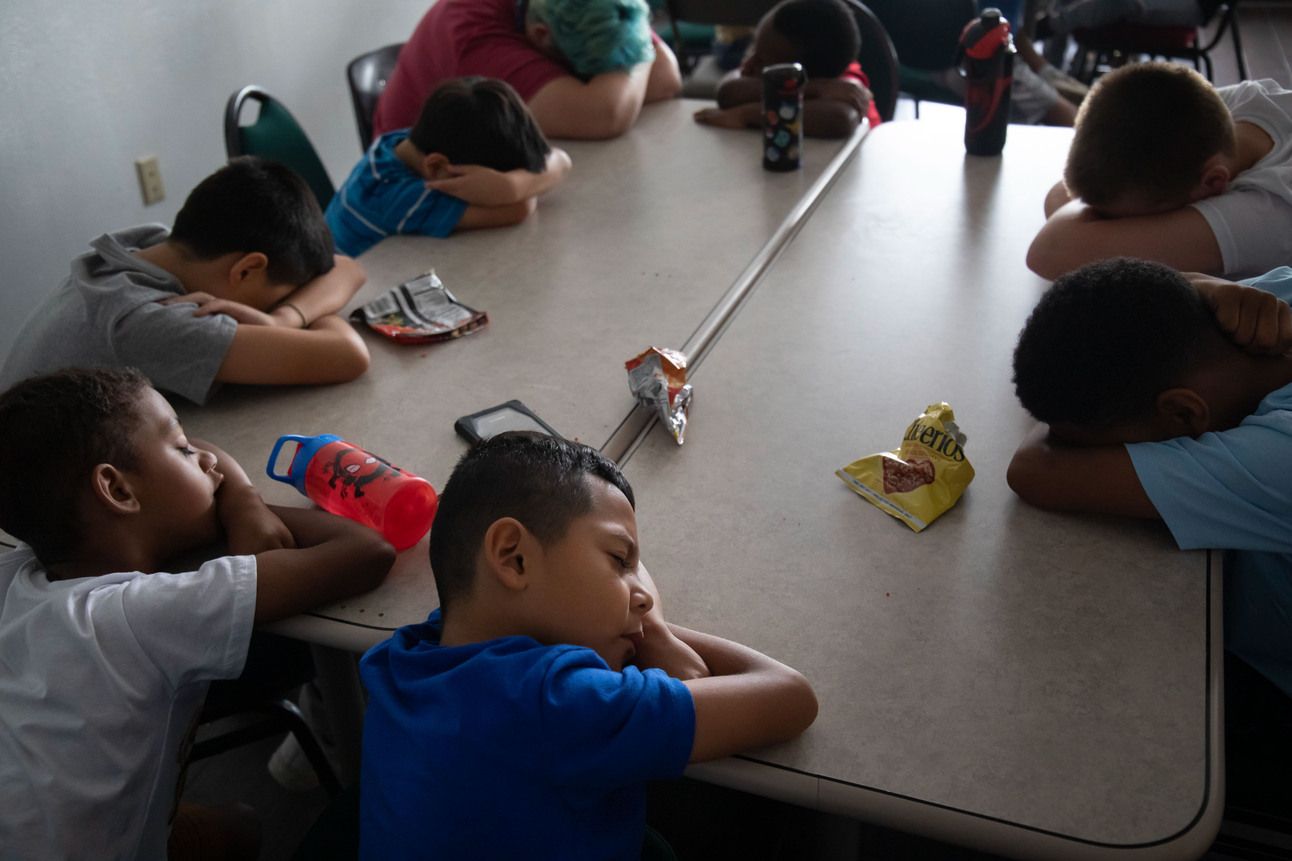
Brandon Thomas, center, leads campers in a group game at a Project Transformation camp in East Dallas in June. "What keeps me coming back is seeing the kids develop from start to end, and watching them grow mentally, emotionally, spiritually," he said. (Lynda M. González for The Lab Report)
They need to eat. The Meals on Wheels volunteer said those words nearly 26 years ago as he returned to his truck, reacting to a woman who barked that she wanted a trip to Burger King and not the chicken cacciatore he brought to her in the brown bag.
The volunteer told a Dallas Morning News reporter that the occasional ungrateful recipient didn’t bother him. He offered to deliver food that day to a dozen or so elderly residents in Old East Dallas because without the service, they don’t eat. That simple. It wasn’t about him or his feelings or what was happening elsewhere.
After all these years—a colleague wrote that story in 1999—the man’s stripped-down wisdom, a shrug of a statement, has been top of mind as I’ve kept tabs on how North Texas nonprofits are continuing their lifesaving work amid the chaos out of Washington. Yes, people need to eat. And they need a place to live. Kids require medical care. Parents can’t work without child care. Seniors and the disabled require transportation help. But across North Texas, many of these vital resources are at risk.
A week after his inauguration, President Donald Trump set about dismantling funding structures that nonprofits across the country rely on. He began by freezing federal grants on January 27. Most recently, the congressional spending bill, which Trump signed July 4, punches holes in Medicaid, the health insurance program that covers low-income and disabled children and adults, and the Supplemental Nutrition Assistance Program, or SNAP, previously known as food stamps.
Executives fear that whittling away at pieces of the federal safety net that provide food and healthcare will create needs too big for local nonprofits to cover. But how can we make sense of the financial impact of these decisions on service providers in North Texas?
It’s tough.
Few are willing to talk on the record for fear of retribution. Indiana University’s Lilly Family School of Philanthropy—the country’s first school dedicated to the study and teaching of this subject—offered its experts for media availability in the spring, then declined my interview request one month later. My questions, submitted in writing, were straightforward. For instance, What is your overall assessment of how the philanthropic community is making its way through the changes coming out of Washington?
Everyone is scared. Most groups that have already weathered cuts fear more difficulties if they speak out. Those who have so far escaped the funding axe look over their shoulders. These days, few doing nonprofit work sleep well.
But what I’ve found, over more than two dozen interviews with nonprofits of all sizes, is that local leaders of these organizations may have yelled and panicked for a moment, but then they got back to work. Philanthropists, nonprofits, and other groups fighting for the vulnerable knew they couldn’t look away from their long-term missions. There’s no time to founder on fears or become paralyzed by headlines about the latest worst-case scenario. Crafting strategies isn’t easy in this slash-and-burn landscape, yet creative thinking, curiosity, and innovation have never been needed more.

Campers close their eyes during a morning group game at a Project Transformation camp in East Dallas, one of eight across North Texas. The annual summer camp, which provides literacy and social-emotional support for children from low-income families, continued this year despite federal funding cuts that affected staff salaries and programming. (Lynda M. González for The Lab Report)
The nonprofit world is trapped in a bizarre liminal space as it braces for more bad news regarding critical funding streams, said Rick Cohen, chief operations and communications officer for the Washington-based National Council of Nonprofits. The reductions are bad enough. But the Trump administration’s budgetary strip mining has been unpredictable and slapdash, not to mention poorly communicated. Every week, if not every day, the rules change and a new list of at-risk funding emerges.
Almost six months into the president’s new term, financial markets—which occasionally wilted under the pressure of increased tariffs and other policy shocks—now sit relatively calm. But philanthropists and those tasked with raising money have hardly exhaled, especially given the just-passed spending bill’s exacerbation of the deficit and federal debt. The downstream reality for nonprofits is Washington’s unpredictability makes it harder to raise private dollars.
“Philanthropy cannot fill in the massive gaps being created by the cancellation of thousands of government grants and contracts,” Cohen said, “so they are all being strategic about next steps.”
The funding cuts, and threats of more to come, target services such as summer lunches and vaccinations for kids; home repairs for the elderly; workforce training and college readiness sessions for first-generation students; and healthcare navigators for families. Grant opportunities vanish from federal websites. Delayed reimbursements create cash flow nightmares. Nonprofits are warned to scrub language mentioning diversity, equity, and inclusion from mission statements, programming, and grant applications. Rumors become fact, and staffers get laid off even before details are settled—and sometimes before court rulings temporarily keep funding in place.
Because most nonprofit CEOs are unwilling to talk on the record, providing an accurate picture of how many organizations in our region have already lost federal funding is impossible. What we can do is follow national reporting to better understand where the Trump administration’s decisions are showing up locally.
The Department of Agriculture’s cancellation of two federal programs since January cost the North Texas Food Bank about $11 million designated for food purchases, including fresh produce bought from local farmers. That loss is the equivalent of 33 million meals, about 28 percent of the total physical meals distributed last year.
Even as the food bank’s staff looks for new pools of money to replace those meals, president and CEO Trisha Cunningham said losing access to federal food resources would be devastating.
“We know our community will step up as much as they can to try to fill the void,” she said, “but we also know that there's no way that they can fill that big of a void.”
“It's been like everyone pushing this big boulder up a hill. All of a sudden, now it’s starting to roll backwards.”
In recent years, many North Texas nonprofits diversified their funding streams while honing their missions. “It's been like everyone pushing this big boulder up a hill,” Cunningham said. “All of a sudden, now it's starting to roll backwards, and it's going faster than we were ever able to push it.”
Nonprofits and programs serving immigrant communities have also been hit hard. Catholic Charities of Dallas, whose work includes resettling refugees in North Texas, for instance, had to lay off 63 staffers after President Trump suspended the U.S. Refugee Admissions Program.
Deep federal cuts also staggered child-focused and faith-based Project Transformation North Texas. All 79 AmeriCorps positions that staff its summer and after-school programs were slashed in late April. The cuts were part of the administration’s decision to eliminate 40 percent of AmeriCorps’ nearly $1 billion nationwide budget.
Of about 500 AmeriCorps slots in North Texas, at least 122 evaporated, according to Rachel Bruns, chief engagement officer of America’s Service Commissions, which represents the various state groups that manage AmeriCorps funding. In addition to the Project Transformation cuts, Dallas-based behavioral health agency Homeward Bound and CLC Inc. in Fort Worth, which provides jobs training, lost positions.

Janai Webster, right, leads a group game at the Project Transformation camp. A student at Benedict College, Webster returned for a second year as a staffer. (Lynda M. González for The Lab Report)

Ally, 7, left, reads with Georgia Lee, a volunteer from First Rowlett United Methodist Church. (Lynda M. González for The Lab Report)
AmeriCorps staffing at programs such as the Senior Source, City Year, and Reading Partners of North Texas were not reduced for this fiscal year, Bruns said. Her organization can find no rhyme or reason as to why some programs were cut and others weren’t.
Kirsten Brandt James, the executive director of Project Transformation, didn’t have time to speculate. Four hundred kids and their parents count on her for free summer camp at eight locations across North Texas. Every day of that play is infused with literacy efforts; 98 percent of kids maintain or improve their reading level, thanks to Project Transformation’s curriculum.
James sounded a quiet SOS, and donors, churches, and foundations stepped in. The kids weren’t disappointed when they arrived on June 3. But the program had been scaled back—50 young adults were hired, which is 20 fewer than in past years, and the camp was reduced from nine to eight weeks.
While the staffers will still earn $4,000, they won’t receive the $1,800 education stipend AmeriCorps would have provided for college expenses in the fall. Many of them, like the children in the summer camp, come from low- to moderate-income households.
In two separate cases, federal judges in Maryland ordered the Trump administration to restore AmeriCorps funding in 24 Democratic-led states and the District of Columbia that sued on grounds the cuts left them struggling to provide much-needed services. While the rulings did not reverse cuts in Texas, Project Transformation learned in late June it would receive its request of $683,000 in AmeriCorps funding for the 2025-26 fiscal year. Still, James says she must lay off full-time staff to conserve the organization’s cash reserves. She anticipates budgeting zero for federal dollars in future fiscal years.
Project Transformation is one of many nonprofits now searching for new funding sources, and that rush has put local philanthropic groups in a tough spot. How many unexpected gaps do they choose to fill for smaller operations? Or should they instead fund a few large programs that make a broader impact? These considerations now underpin decisions to give.
Nonprofits and the philanthropic community have been through a lot these last 25 years. The terrorist attacks of Sept. 11. The Great Recession of 2007 to 2009. The pandemic. But most people I’ve spoken to in the business of doing good say the first half of 2025 has been the most challenging and stressful yet. The word “unprecedented” is uttered in every conversation.
The disruptions are not letting up. While the just-approved cuts to Medicaid and SNAP won’t kick in until after the mid-term congressional elections next year, local nonprofits must plan now for potentially staggering fallout.
Texans received more than $7 billion in SNAP benefits in fiscal year 2024, according to the nonprofit Feeding Texas, an umbrella group for food banks across the state. Tougher eligibility rules and funding changes almost certainly will create greater food insecurity for low-income households. The Medicaid changes will cost the state $39 billion, or 10 percent, of its federal funding for the healthcare program over the next decade, according to health policy nonprofit KFF. Provisions of the new legislation also put in place restrictions for enrollment in Affordable Care Act marketplaces. Taken together, KFF predicts, 1.7 million Texans could lose coverage.
Nonprofit boots on the ground tiptoe through the uncertainty. None can predict what funding deficits will emerge next. In the meantime, they do what they do best: serve the vulnerable. They are focusing on how to continue to fulfill their missions despite the precarity, because, as the volunteer said from Meals on Wheels’ Route 25 all those years ago, people still need to eat.
Sharon Grigsby is the co-founder and senior writer of The Lab Report. [email protected].
We’ll send a new story to your inbox every Wednesday. Have a friend who would appreciate it? We’d love for you to forward this email to them.


